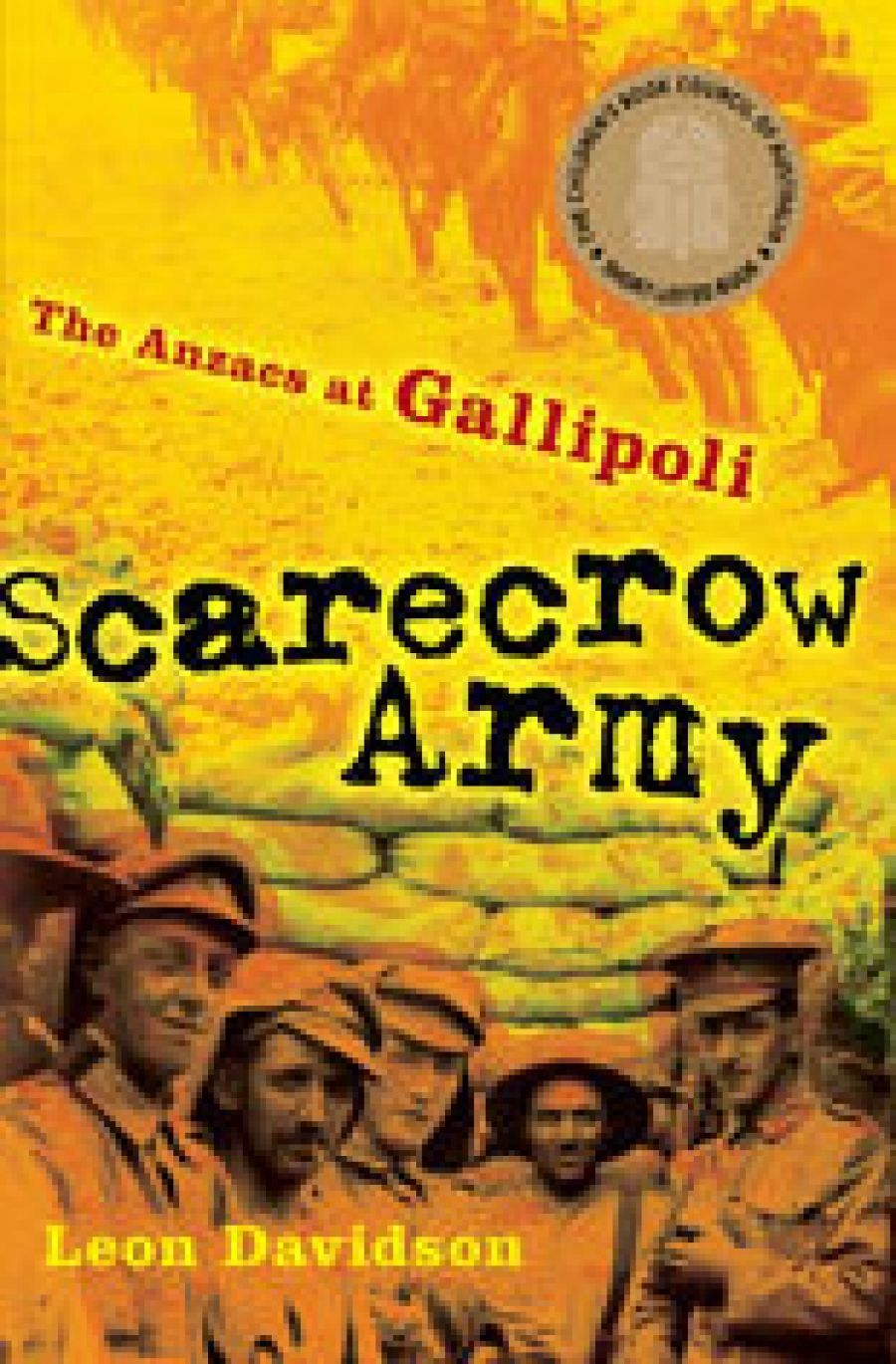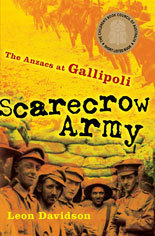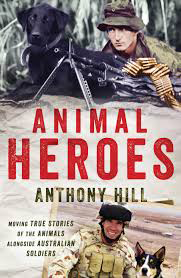
- Free Article: No
- Contents Category: War
- Review Article: Yes
- Article Title: Hollow triumph
- Online Only: No
- Custom Highlight Text:
One walks a fine line between patriotism and claptrap when writing about anything to do with war. Especially when writing for young people, one tries to salute the courage of soldiers and to honour the fallen, but also to instil caution in potential young soldiers; to convey that war is hell and that it shows human beings at their worst. Of course, one wants to tell an exciting story, too, with heroes and villains and suspense – with maybe a history lesson or two thrown in. Two of the following books succeed majestically in this task; the third falls far short.
- Book 1 Title: Scarecrow Army
- Book 1 Subtitle: The Anzacs at Gallipoli
- Book 1 Biblio: Black Dog Books, $16.95 pb, 186 pp
- Book 1 Cover Small (400 x 600):

- Book 1 Cover (800 x 1200):

- Book 2 Title: Animal Heroes
- Book 2 Biblio: Penguin, $17.95 pb, 232 pp
- Book 2 Cover Small (400 x 600):

- Book 2 Cover (800 x 1200):

- Book 3 Title: Alexander The Great
- Book 3 Subtitle: Reckless Conqueror
- Book 3 Biblio: Black Dog Books, $16.95 pb, 183 pp
- Book 3 Cover Small (400 x 600):

- Book 3 Cover (800 x 1200):

In Alexander the Great: Reckless Conqueror, Carole Wilkinson captures that tension between praising a man of enormous courage and skill and lamenting the wicked folly of much of what he accomplished. She tells the story of the young warrior-king who, not content with ruling over his ragtag dominions in Macedonia, set out to conquer the world – a mission that lasted eleven years, and from which he did not return.
Wilkinson blends the available facts about Alexander’s life and career with some of the legends that have grown up around his name. She skilfully interweaves short fiction chapters into the historical narrative, informing us about the events unfolding from Alexander’s point of view. Through his own eyes, we see Alexander as a young boy taming a horse that none of his father’s grooms could handle; later, we see him as a conqueror, entering cities such as Susa and Babylon in triumph, full of his own glory yet also haunted by feelings of inadequacy, and suspicious that these sophisticated and wealthy Persians may view him as a barbarian.
The research is prodigious and the story set out in fine detail – there is much here to inform an adult reader, too. Wilkinson explains clearly and carefully such matters as how Alexander’s fighting force was organised, what the soldiers wore and what weaponry they used. This information is backed up by detailed drawings, maps and charts. The text is also scattered with small insets, in which original sources are quoted, terminology explained, or amusing asides added. There is also a helpful cast of characters, a timeline and an index.
Wilkinson is a fine writer, clearly fascinated by the ancient world. She is the author of Dragonkeeper (2003), the award-winning children’s fantasy about a slave girl during the Han Dynasty in China who befriends a dragon, and of the popular ‘Ramose’ series about an Egyptian prince during the time of the Pharaohs. Here, Alexander is not judged according to the standards of our time. There is no false political correctness, no tut-tutting about his violence, nor scoffing at his superstitions. Rather, Wilkinson makes the point that, even according to the standards of his own day, Alexander’s motives were baffling. She tells us that his peers understood violence and bloodshed – it was their way of life – but they could not understand conquest for the sake of conquest, where the plunder was spent on more campaigns and where the only goal seemed to be the extension of the boundaries of the map.
Wilkinson opines that, while most military victories are eventually futile, Alexander’s triumphs were particularly so. Immediately after his death, his generals took to squabbling and his empire soon fell apart. His own family was destroyed by his ambitions, and Wilkinson does not forget the millions he killed or enslaved. This is an exciting and informative read, conjuring up the ancient world in a most satisfying way. It is also beautifully presented; the design team at Black Dog Books should be congratulated for making the information so attractive and reader friendly.
In this year of the ninetieth anniversary of the landing of the Anzacs, much of the myth of Gallipoli is being demolished. Several new books show these heroes warts and all, and ask serious questions about the conflict for which they suffered so much. With Scarecrow Army: The Anzacs at Gallipoli, we have a book for a young audience that corrects much of the starry-eyed jingoism but that will nevertheless leave its readers with pride and a warm glow on Anzac Day.
Leon Davidson, a Kiwi who likes to remind us what the ‘NZ’ in Anzac stands for, has written a moving account of this terrible series of battles. Davidson relays the truth about what the Anzacs went through: the bungled orders; the long months of hardship and privation; and the utter pointlessness and eventual failure of the mission. His descriptions of burning bodies, makeshift burials, starvation and terror are heart-breaking and evocative. Drawing on the most up-to-date research on the subject, he is frank about what manner of men the Anzacs often were: before the war started, they had a reputation for drunkenness and whoring – syphilis was rife in the camp before a shot was even fired – and at first, he tells us, there were numerous desertions under fire. In one episode, men were held at gunpoint by their officers lest any more of them fled. But Davidson shows, too, how this terrible ordeal made heroes of these ordinary men, and how it is right that we honour them. He presents the soldiers as heroes despite themselves: men who in the heat of battle were frightened but did their duty and helped their mates; men who were wounded but gladly returned to the fray as soon as they could hold a gun.
Scarecrow Army is, like Alexander, another handsome offering from Black Dog. It is organised much like Alexander, with insets making interesting points or quoting from diaries. The straight historical narrative is humanised and enlivened with lightly fictionalised chapters in which we meet some of the young soldiers – the Turkish ones, too – and see the war from their perspective. This fine book is a worthy offering about a complex and sensitive subject.
Less worthy is Animal Heroes, a collection of stories about animals that have helped the troops in one way or another in each of Australia’s overseas conflicts. Although Anthony Hill, a frequent writer about all things military, takes a boisterous, gung-ho tone, concentrating on relating animal ‘heroics’, most of these stories are painful to read for anyone fond of animals. Beginning with the Great War, we have the story of Driver, a silky terrier taken to war in his master’s pocket. What kind of an idiot, one wonders, would take a puppy off to war? Apparently, many soldiers did so – and they took kangaroos, wallabies and possums, too. Hill then tells us about tracker dogs, cavalry horses and mules, ships’ cats, messenger pigeons, mine-seeking dolphins and the rest, right up to the present day.
Most of these animals came to a bad end of one sort or another. They were lost, abandoned, killed or forgotten. There is also much thoughtless cruelty about which Hill seems oblivious. It is not funny to feed animals alcohol in order to watch them stagger about; and the story about passing a baby crocodile with its mouth taped shut around a mess hall until it was so frightened it made a mess of its own is dreadful. The only animals to make it home from the terrors of war did so by flouting Australia’s quarantine laws, something else Hill seems to think is funny.
The one positive contribution this book makes to our understanding of things military is no doubt unintended. Hill shows us clearly the aimless idleness and tomfoolery that so often goes on in military encampments. The real heroes there would be ashamed of this mob.
All three of these books – the good and the bad – present a realistic view of warfare and army life. War is hell; war is failure; war is suffering – these books demonstrate these relentless facts of life.


Comments powered by CComment